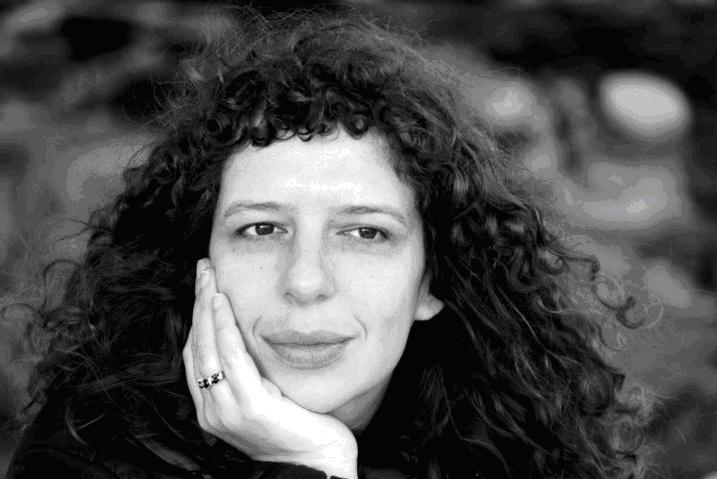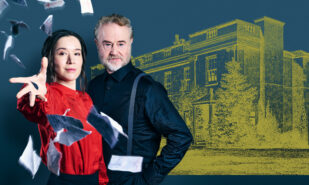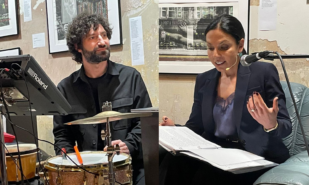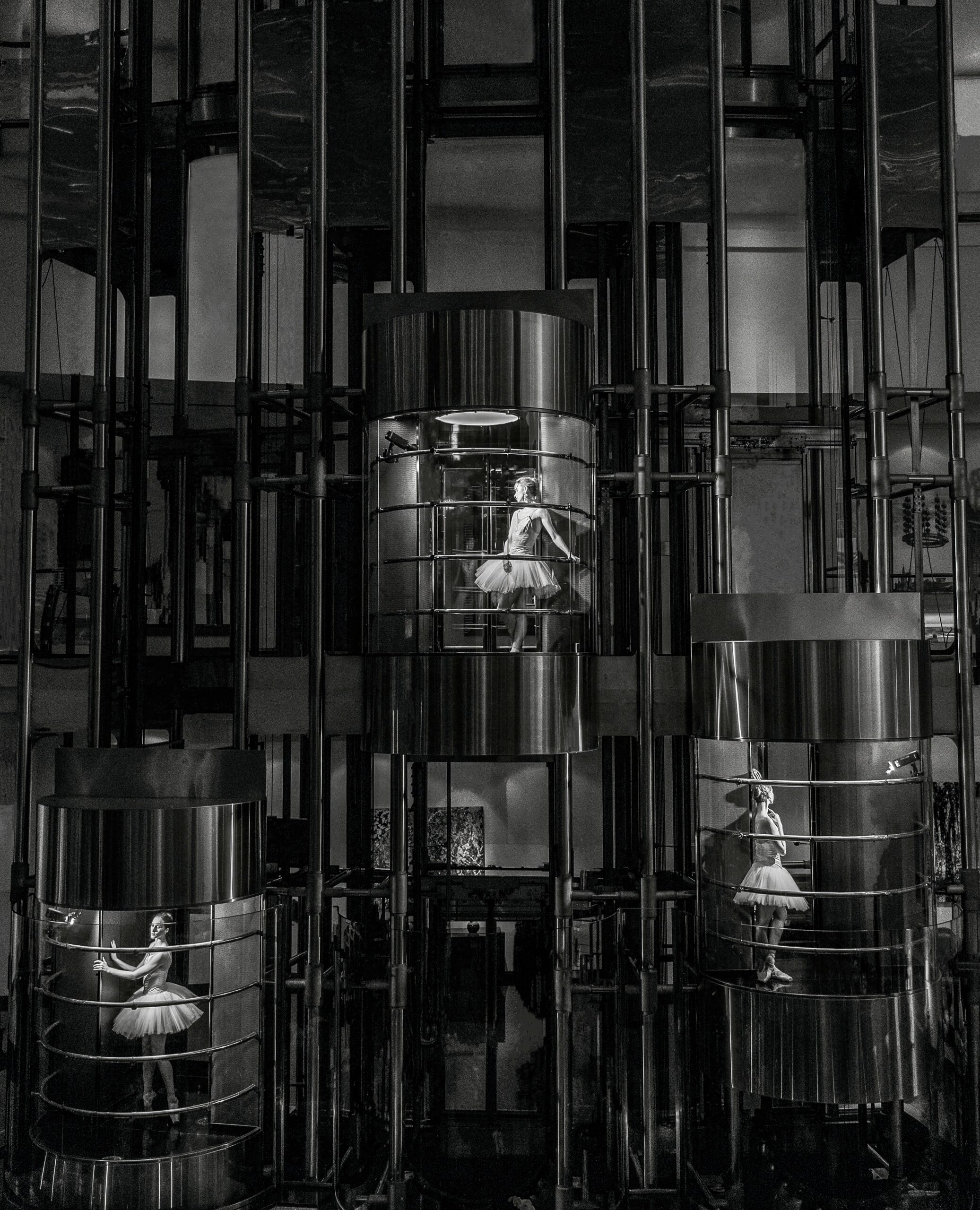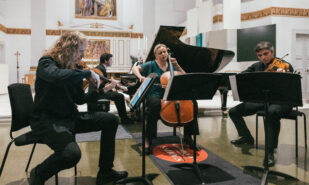Polina Barskova: “I’ve been working with ceramics for twenty-five years”
Polina Barskova is a poet, prose writer, philologist, and professor at the University of California, Berkeley. She has two upcoming events in London: Cultural Memory of Blockaded Leningrad – a dialogue with Susan Larsen on June 17, and a solo evening, On Metamorphoses and Relocations, on June 21. Barskova recently published a new novel – captivating, engrossing, a little frightening, slow and deep, like the waters of St. Petersburg – Sybils, or The Book of Wondrous Transformations. That’s where our conversation began.
– Your new novel, Sybils, or The Book of Wondrous Transformations, is, on one hand, the story of a watercolor teacher and Kunstkamera curator, the artist Dorothea Merian, who came to Russia at Peter the Great’s invitation. On the other hand, it’s about a young woman who found herself in the U.S. in the late 1990s. The writer in you who creates that text—are the historical and personal voices one person, or two?
– I think all of this comes from the corners of the same person—like in those puzzles about communicating vessels, though not always obviously so, even to the author herself. I say this as a philologist, someone who believes that the author’s judgment of what they’re doing should only be trusted up to a point.
When I began writing Living Pictures in 2014 (my first prose book), I was around thirty-five and had been writing poetry for many years (since I was eight—yes, I’m that suspicious sort of phenomenon). But I had the sense that some things couldn’t be conveyed in verse.
For me, poetry is urgent—an emergency format. My poems, like in a fairy tale I love, jump out of me the way frogs or roses once leapt from a princess’s mouth. But to contemplate certain things, I need to slow down. That’s why prose became, if you like, my art of slowness.
– And the poet and prose writer in you—are they the same person too?
– I’m tempted to use an unusual metaphor—for me, at least—something athletic, like biathlon or triathlon. It’s one drive, one desire, but very different skills.
In poetry, I have to contain an intense flame—discipline it. Among all the simple recipes for writing a good poem, I like this one: when you’re dying of love, it’s very useful to write a poem about, say, a cat’s morning.
I borrow from Viktor Shklovsky’s idea of the knight’s move: when you reroute your emotion into a different channel, something interesting might happen. But in prose, I try to say what I mean to say—more directly.
Sybils is about finding yourself outside yourself, beyond your familiar life—and how that can become your fate, your creativity, your new self. I thought it would be engaging and distracting to write about some marvelous creature who wasn’t me. And so the Gzely artist family was born.
– Do you feel related to them, in some way?
– After all these years? Certainly. I wrote this book almost daily for the past three years. Recently, at a friend’s place, I saw a ballet barre and imagined her life—what we do with words is very much like regular physical training, yet so different. I never know when a poem will strike: theme, state, and sound must align.
But with Sybils… For three years I told everyone I was writing a book about caterpillars. I loved seeing their surprise, disgust, horror—wondering if I’d lost my mind. Writing a hybrid text that touches scientific, historical, and popular genres—perhaps that’s where some madness lies.
It began when I slowly started learning about the great Sibyl Merian, then about her remarkable daughter. I found out how little is known about them—even among specialists. Almost no one had heard of Dorothea, despite her being quite significant in Russian science. It’s the sense that history washes away individuals—especially in the story of emigration.
– Does emigration change a person? For you, does it feel like something that happened long ago or just recently?
– Both, absolutely. And this book emerged in response to February 2022, to the feeling that I personally could not go to Russia. There’s a bitter irony here: I probably could buy a ticket, land at Pulkovo, and go to the Strelka. I don’t think flashing-lights cars would chase me.
There’s a historical anecdote: Brodsky and Baryshnikov stand on the Stockholm waterfront and say, “Let’s just get on something and be there.” And then freeze at the thought of how hard that really is. I think their feelings were an intense Molotov cocktail of longing.
My situation is less dramatic now, but the city is very dear to me. All the people I’ve recently lost are there—shadows, new forms of them.
I left at twenty-one, not understanding the seriousness of it. Most of my life has passed in this new place and state. Until recently, I thought that was a miracle—for a writer, change is good.
But must a writer always travel from Kupchino to Oakland? I don’t know. A dear friend just sent me a photo of Proust’s bed from his museum-flat—he wrote one of the 20th century’s greatest works there. He didn’t need to change cities or languages.
Each of our stories is monstrously individual. I thought emigration helped me understand myself and my writing. But in the past three years, it’s just become very hard and painful—that, too, will likely feed my writing in time. In short: emigration is incredibly complex.
– Do you feel a difference between how you wrote poems at age eight and how you write now?
– Honestly, not really. It’s strange—because the accumulation of texts and the sense of responsibility are so different now.
The ballet barre metaphor fits: I’ve been at this barre for forty years. But the thing about poetry is that it only works when you both know and don’t know what the poem will be. It’s always a risk.
I recently read about one of my favorite painters, Perugino, and his trial of mastery—and I pondered the nature of skill and craft. You train your hand so well that you’re sure it’ll be “good,” as it always has been.
It’s very hard—unless you’re someone like Velimir Khlebnikov—to ignore the reader/listener, but you must try. You have to look away from that charming face, from the tension, from the desire to seduce the reader.
– You mean the reader’s face?
– Yes, the reader, the listener—whoever they are. You must let go of them and say, “I’ll try something entirely new”—as much as a person can do something entirely new.
In a recent lecture on Akhmatova, I talked about how one of her miracles was that she constantly changed. Her very early poems—those “oysters in ice”—were daring and popular.
But she left that path, that success, and became a different writing being. There’s not much in common between Poem Without a Hero and those sharp little vignettes. They’re different methods.
So I believe in the idea of evolution. But every time, I don’t know if I’ll manage it. And that’s both frightening—and deeply fascinating.
– Does translation turn a poem into a new work?
– Absolutely. Translating poetry is an incredibly strange area. The task of creating a new poem in a new language and culture is monstrously hard.
I talk about this a lot with my friends—Eugene Ostashevsky, Matvei Yankelevich, Ainsley Morse—great translators in my circle. I admire their craft endlessly, though I don’t understand it fully—only that it’s very slow art.
Matvei is finishing The Voronezh Notebooks by Mandelstam now; Zhenya is struggling with Vaginov’s poems. It seems to take forever.
I’m fascinated by the intersection of art and time—that’s one of the metaphors in Sybils. It’s a life passion of mine: thinking about how we experience time passing.
I’ve been working with ceramics for twenty-five years. It’s my so-called hobby—something I allow myself to do with passion and mediocrity.
Ceramics teachers talk a lot about time: once a mug is shaped, it must sit for two days before a handle is attached—that takes half a day. It amuses me deeply: I, too, am the result of craft—of learning in a youth poetry circle. The interplay of craft, impulse, and madness—that’s what interests me now.
– You’re a juror for the 2025 Pushkin House Book Prize. What does that mean to you now?
– Today, no matter which aspect of Russian history we look at, we see the reflection of today’s disaster. I’ve repeated one thing for three years: for those connected to Russian civilization and language, nothing is “normal” today.
I’m now opposed to normalization in our discourse. The fate of the Russian book is as catastrophic and complex as every other segment of this situation.
Our prize may be the only platform in the West still trying to discuss how Russia is viewed today. That’s a painful question.
Reading the submitted books was a vital exercise. I’m fully prepared for some to say such books shouldn’t exist.
But even if we ban books about Russia, Russia clearly isn’t going away. If the world stops trying to understand it, Russia will keep doing what it’s doing.
It’s an ambitious, powerful, terrifying player—some think mad, some think coldly rational—but no one disputes that Russia, to our shame, fear, whatever, is trying to make history.
And this prize is one of the attempts to reckon with that.
– As someone writing in Russian, do you think the language will change?
– Absolutely. I’m beginning to research the literature of the so-called Second Wave of emigration—those who left the USSR in 1944–45. It’s been studied far less than the First or Third Waves.
I’m especially interested in their language: they took the Soviet language with them, then tried to describe non-Soviet experiences using it.
It’s fascinating to see how First Wave émigrés reacted to them—what conflicts arose.
Language changes especially in times of crisis—and one of our main tasks now is to observe how it changes, suffers, and helps us either remain ourselves or become someone new.
Right now, everything is in painful flux—including language.
We’re living through a historical moment of constant, irritating, multifaceted torment—but from that, for better or worse, great literature may emerge.
Tickets for the upcoming events:

